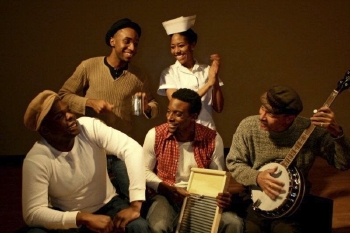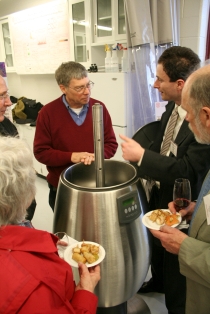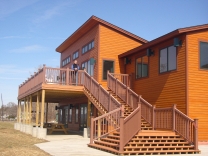THE ESSENTIALS
THE ESSENTIALSideas>>people>>details>>data>>happenings
BIG RED ATHLETICSMen's lacrosse falls in overtime to Syracuse, 10-9, in NCAA final
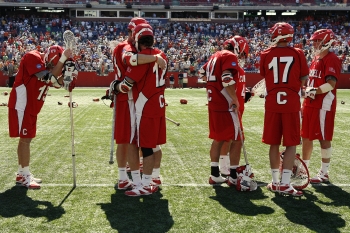
Cornell men's lacrosse team reacts to loss to Syracuse See larger image
In a thrilling, heartbreaking finish, the Cornell men's lacrosse team lost in overtime to Syracuse University May 25 at the NCAA championship game in Foxborough, Mass., 10-9.
Before 41,935 spectators at Gillette Stadium, the No. 5 Big Red fell short one goal to the No. 2 Syracuse Orange, the defending national champions, in the central New York matchup.
"[They] battled through two pretty tough lacrosse games and almost pulled this one off," head coach Jeff Tambroni said after the game. Two days earlier, Cornell had dismantled the No. 1-ranked University of Virginia, 15-6, in the semifinals.
Feldshuh play 'a triumph'
"Miss Evers' Boys," the 1992 Pulitzer-nominated play by Cornell's David Feldshuh, was performed in New York City this spring. It tells the story of the 40-year Tuskegee study, a U.S. Public Health Service study that began in 1932 on the effects of untreated syphilis on some 400 impoverished African-American males in Macon, Ala. The men were never told they had the disease nor were they informed of treatment options, even after penicillin had been proven as a cure. The title character is an African-American public health nurse who assists doctors with the study.
"This 'Miss Evers' Boys' is a triumph," wrote Blogcentric's theater editor Jon Sobel in an online review. "The stars seem to have aligned for this production: excellent actors perfectly cast, with a director [Melanie Moyer Williams] who knows just how to seize on the strengths of Feldshuh's scenecraft. ... Their superb performances ... flesh out the disturbing story that Mr. Feldshuh's script tells so achingly."
Teaching winery opens on campus
With the snip of a grapevine, Susan A. Henry, the Ronald P. Lynch Dean of Agriculture and Life Sciences, opened the CALS Teaching Winery April 1.
Cornell, long known for its viticulture research, now claims the only university teaching winery in the eastern United States. The $900,000 facility promises to prepare students for careers in New York's wine and grape industry, which ranks third nationally in wine production and includes more than 250 wineries across the state.
The 1,800-square-foot winery building, attached to the Cornell Orchards store, will act as the Ithaca hub for CALS' new viticulture and enology undergraduate major, which enrolls roughly 30 students and draws on more than 50 faculty members from the horticulture, food science technology, plant pathology and applied economics and management departments. Inside the winery, students will access cutting-edge equipment to learn the science and art of winemaking.
Making waves
The Merrill Family Sailing Center on East Shore Drive is now finished -- providing a new home for the Cornell Sailing Team, sailing physical education classes, summer sailing camps and the Cornell Community Sailing Program.
The 5,466-square-foot facility overlooking Cayuga Lake has two levels, an expansive deck, classrooms, a wet lab for research and locker rooms.
The late Phil Merrill '55, his wife, Eleanor Merrill, and their three children -- Douglas Merrill '89, MBA '91, Catherine Merrill Williams '91 and Nancy Merrill '96 -- made the lead gift to the facility.
The Cornell Community Sailing Program, which is open to the public, welcomes novices and experienced sailors. The season began June 1. For information, call (607) 277-9307.
PBS documentary examines career of Cornell's late Tommy Gold
The Cornell professor who helped NASA put men on the moon, recruited Carl Sagan to the Cornell faculty and advanced controversial theories on everything from the physiology of hearing to the consistency of the moon's surface to the origins of oil is the subject of a new documentary, "Renegade Genius: The Story of Tommy Gold," airing on PBS stations in May and June.
The film portrays Gold, who died in 2004, as a "brilliantly original thinker," far ahead of his time, who thought far outside the box. At a time when disciplinary boundaries were high, Gold leapt over them with ideas practical and visionary. Though not always right, Gold's ideas forced the conservative scientific community to consider new ways of thinking over many decades.
Gold came to Cornell in 1959, retiring after nearly three decades on campus, during which time he helped rebuild the astronomy department, was a champion of the new Space Sciences Building and aided the establishment of the Arecibo Observatory in Puerto Rico.
Call us MacCornell: We have our own tartan

Complete with the playing of the alma mater on bagpipes, the Cornell Design League Fashion Show unveiled Cornell's official tartan in April. The plaid makes Cornell the only Ivy League school to have its own tartan registered with the Scottish Tartans Authority.
Jessie Fair, a senior in fiber science and apparel design, designed the tartan, which is predominantly wine red with cream and has a hint of gray with dusty blue stripes.
Trustee Mort Bishop III '74, president of Pendleton Woolen Mills, presented scarves designed with the plaid to trustee Ezra Cornell IV and Susan Murphy, vice president for student and academic services. "Now Cornellians can show their colors with a visual brand that represents the school," says Bishop. "The Cornell tartan provides a way to celebrate Cornell, and also raise awareness and money for the Far Above campaign."
Pendleton will use the plaid to create official Cornell scarves, stadium blankets and other products. Bishop has donated 600 scarves to Cornell.
Chinese reclaim fungi after 70-year Cornell stewardship
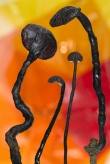
After years of stewardship by Cornell scientists, a collection of more than 2,000 species of native Chinese fungi, spirited out of the country for safety before World War II, is finally set to make its way home.
On April 13, a delegation of Chinese government officials, led by State Councilor Liu Yandong, visited campus to begin repatriating the fungi to China. The specimens are the legacy of S.C. Teng, a Cornell student-turned-pioneering-scientist who risked his life during the war to keep the fungi safe.
Steve Reich '57 wins Pulitzer

New York-based composer Steve Reich '57, whose music is lauded for embracing the spoken word and non-Western rhythms, is the 2009 Pulitzer Prize winner for "Double Sextet," a piece composed for two identical sextets of instruments, each made up of flute, clarinet, violin, cello, vibraphone and piano.
The New York Times called "Double Sextet" "a major work that displays an ability to channel an initial burst of energy into a large-scale musical event, built with masterful control and consistently intriguing to the ear."
"This is a richly deserved award to a man who may be America's greatest living composer," says Anne Midgette, chief classical music critic of The Washington Post. The Eighth Blackbird ensemble of Richmond, Va., premiered "Double Sextet" in May 2008.
